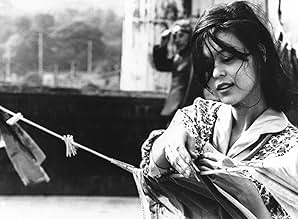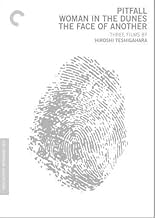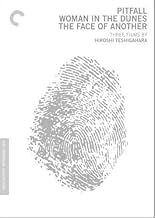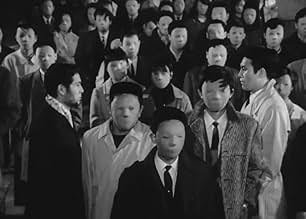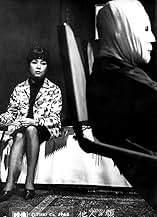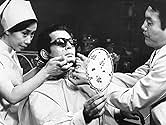VALUTAZIONE IMDb
7,9/10
11.167
LA TUA VALUTAZIONE
Un uomo d'affari con una faccia sfigurata ottiene una maschera realistica dal suo medico, ma la maschera inizia ad alterare la sua personalità.Un uomo d'affari con una faccia sfigurata ottiene una maschera realistica dal suo medico, ma la maschera inizia ad alterare la sua personalità.Un uomo d'affari con una faccia sfigurata ottiene una maschera realistica dal suo medico, ma la maschera inizia ad alterare la sua personalità.
- Premi
- 2 vittorie totali
Robert Dunham
- Foreign man in Bar
- (non citato nei titoli originali)
Recensione in evidenza
Mr. Okuyama (Tatsuya Nakadai) is a physically and emotionally wounded man. After an industrial accident at work, his face has been scarred and mutilated beyond recognition, and even his wife rejects him, even though she says his physical appearance doesn't matter. It has left him bitter and angry, until his psychiatrist Dr. Hira (Mikijiro Hira) comes up with a way to fashion a 'face mask' that will give him the appearance of having a completely normal face, albeit with a few joining marks. Hira doesn't do this just out of kindness, he is fascinated how this new face will alter Okuyama's personality and way of life.
The Face of Another is a fascinating film that highlights the social attitudes to physical appearance. There are hundreds of films and morality tales that teach you that it is inner beauty that counts, and once you allow this to shine then your physical attractiveness becomes irrelevant. Everyone knows that this is bullshit, so its refreshing to see a film that makes it clear from the outset that physical appearance has a massive part to play in society. Okuyama's new face, which is an attractive one, changes him so much that he takes on an almost dual identity. Dr. Hira delights in telling him that he has bought flashy new clothes, something he was never concerned with before. It becomes clear that whilst before Okuyama merely wanted to be normal again and fit back in society, his new face is engulfing him, and to be 'normal' simply isn't enough anymore.
As with many of the Japanese New Wave film-makers of the 1960's-70's, director Hiroshi Teshigahara takes some bold steps and sneaks in some surrealist and art-house values in a movie that is otherwise played relatively straight. A 'fictional' character appears every now and then throughout (she is first imagined by Okuyama's wife as a character in a movie); one side of her face is scarred and burned. She appears quite rarely, but seems to serve as an alternative to Okuyama's increasingly vain soul. Another scene seems a ball of hair that floats in the air, unnoticed by the people in the laboratory. I have no idea what it meant, and couldn't really admit to it being wholly successful, but it certainly got my attention nonetheless.
A powerful, disturbing, and poignant drama/horror from the greatest era in Japanese cinema. The film seems all the more important now, 45 years on, in a world where a botox injection can be as easy as buying a pack of cigarettes, and where physical 'beauty' is less a bonus than a necessity.
www.the-wrath-of-blog.blogspot.com
The Face of Another is a fascinating film that highlights the social attitudes to physical appearance. There are hundreds of films and morality tales that teach you that it is inner beauty that counts, and once you allow this to shine then your physical attractiveness becomes irrelevant. Everyone knows that this is bullshit, so its refreshing to see a film that makes it clear from the outset that physical appearance has a massive part to play in society. Okuyama's new face, which is an attractive one, changes him so much that he takes on an almost dual identity. Dr. Hira delights in telling him that he has bought flashy new clothes, something he was never concerned with before. It becomes clear that whilst before Okuyama merely wanted to be normal again and fit back in society, his new face is engulfing him, and to be 'normal' simply isn't enough anymore.
As with many of the Japanese New Wave film-makers of the 1960's-70's, director Hiroshi Teshigahara takes some bold steps and sneaks in some surrealist and art-house values in a movie that is otherwise played relatively straight. A 'fictional' character appears every now and then throughout (she is first imagined by Okuyama's wife as a character in a movie); one side of her face is scarred and burned. She appears quite rarely, but seems to serve as an alternative to Okuyama's increasingly vain soul. Another scene seems a ball of hair that floats in the air, unnoticed by the people in the laboratory. I have no idea what it meant, and couldn't really admit to it being wholly successful, but it certainly got my attention nonetheless.
A powerful, disturbing, and poignant drama/horror from the greatest era in Japanese cinema. The film seems all the more important now, 45 years on, in a world where a botox injection can be as easy as buying a pack of cigarettes, and where physical 'beauty' is less a bonus than a necessity.
www.the-wrath-of-blog.blogspot.com
- tomgillespie2002
- 23 lug 2011
- Permalink
Trama
Lo sapevi?
- QuizDirector Hiroshi Teshigahara said that he intended the film to explore both personal and cultural identities. While the examination of personal identity is quite overt, Teshigahara also explored how Japan's cultural identity had been impacted by World War II and its aftermath.
- Citazioni
Psychiatrist: You're not the only lonely man. Being free always involves being lonely. Just there is a mask you can peel off and another you can not.
- ConnessioniReferenced in Il funerale delle rose (1969)
I più visti
Accedi per valutare e creare un elenco di titoli salvati per ottenere consigli personalizzati
- How long is The Face of Another?Powered by Alexa
Dettagli
Botteghino
- Lordo in tutto il mondo
- 35.185 USD
- Tempo di esecuzione2 ore 2 minuti
- Colore
- Mix di suoni
- Proporzioni
- 1.33 : 1
Contribuisci a questa pagina
Suggerisci una modifica o aggiungi i contenuti mancanti

















